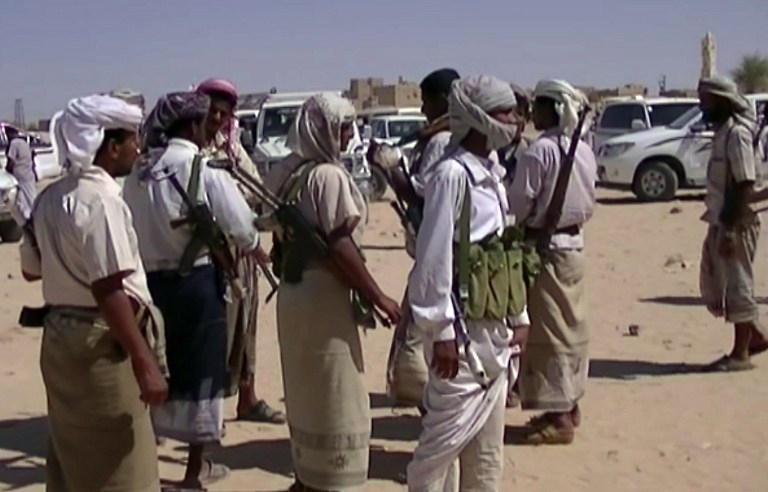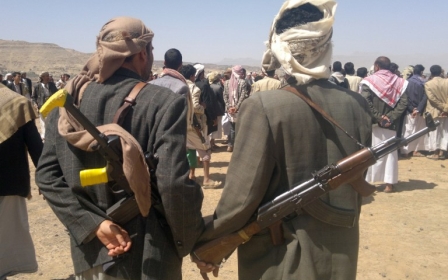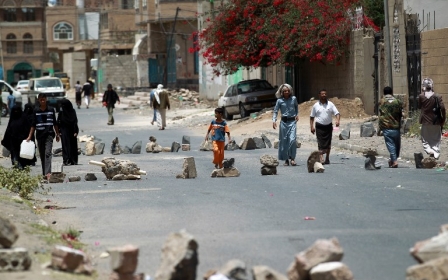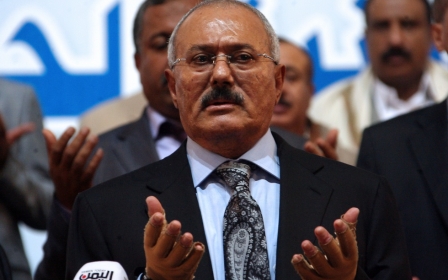Six militants and three Yemen troops killed in clashes

Six suspected al-Qaeda militants and three Yemeni troops died in clashes Sunday in the southeastern province of Hadramawt, a local official said.
Five other militants were arrested as army troops raided a house in al-Qatn city where a "terrorist cell" was holing up, the ministry's website quoted an unnamed military source as saying.
Five soldiers were injured in the clashes, the source added.
"At dawn, armed forces bombarded a house where Qaeda fighters had barricaded themselves in, killing three of them and wounding others," the official told AFP on condition of anonymity.
The body of a fourth militant was later found in a house in the Hadramawt town of Qatan, along with four people who were arrested, a military source said.
He said the people arrested were two men - a Yemeni and a Somali - and two women, a Pakistani and a Philipina.
In response to the army's action, other militants arrived from nearby and attacked an army position in Qatan, sparking a shootout, the local official said.
"Three soldiers were killed and six wounded during four hours of fighting," the official said, adding: "Two of the attackers died and four were wounded."
Weapons of various calibre were used in the skirmish and several nearby homes were damaged, witnesses said.
On Thursday a policeman and two militants died in clashes in Mukalla, capital of Hadramawt.
Authorities in the city said they had prevented three suicide car bomb attacks against an official residence, a police barracks and another police site.
The defence ministry said it had "thwarted a dangerous criminal plan by Qaeda" in Mukalla.
To deal with the growing number of attacks attributed to Qaeda-linked militants, the army has stepped up its presence with a view to launching an offensive against the extremists.
Houthi-tribesmen clashes
Meanwhile, at least 15 Yemeni tribesmen were killed over Friday and Saturday in clashes with Shia Houthi militants in the northeast of the country, an official source said.
"Dozens were killed in clashes between the Houthi militants and tribesmen in Al-Safraa area on the border between Al-Jawf and Maarib provinces," the source told Anadolu Agency on the condition of anonymity.
"At least 15 tribesmen were among the deaths," he added.
Clashes are still raging in the region, but casualties are yet to be determined, the source said.
Earlier in the day, a tribal source said that president Abd Rabbuh Mansur Hadi ordered the reassignment of a committee formed to mediate a ceasefire in the northern Al-Jawf province between the army and allied tribes on one hand and Shia Houthi militants on the other.
The committee would try to mediate a ceasefire and enforce an earlier truce deal that was signed earlier this month between the warring rivals in the region, he added.
Clashes flared up again in the restive province on Friday, one day after the mediation committee declared failure to consolidate the ceasefire and withdrew from the disputed areas.
Committee member Mohamed Daraan blamed the Houthi group for the deadlock, saying it “repeatedly stalled a deal.”
Clashes first erupted in Al-Jawf between Houthis and local tribesmen in April, resulting in casualties on both sides.
A few weeks ago, the mediation committee succeeded in forging a temporary ceasefire, but this proved short-lived.
Al-Jawf is strategically important in that it is located near Yemen's eastern Maarib province, the center of the country's oil production.
Yemen has been dogged by turmoil since pro-democracy protests forced autocratic president Ali Abdullah Saleh to step down in 2012 after 33 years in power.
Al-Qaeda has been active across several parts of Yemen, since the 2011 uprisings.
In recent months, scores of security personnel have been killed in attacks across the country that officials blame on suspected Qaeda-linked militants.
New MEE newsletter: Jerusalem Dispatch
Sign up to get the latest insights and analysis on Israel-Palestine, alongside Turkey Unpacked and other MEE newsletters
Middle East Eye delivers independent and unrivalled coverage and analysis of the Middle East, North Africa and beyond. To learn more about republishing this content and the associated fees, please fill out this form. More about MEE can be found here.




